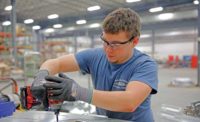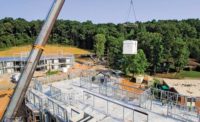Barely in their early 20s, the oldest members of the cohort known as Generation Z are already influencing the social and economic landscape, bringing energy and digital savvy that may reshape how people work and live. The same might be said of “Generation Z” construction firms, such as 21-year-old finish contractor Philadelphia D&M, ENR MidAtlantic Specialty Contractor of the Year. “Our youth helps push us forward with our innovation,” says the firm’s president, Craig Melograno, who, at age 49, is the oldest member of the Philadelphia-area company’s executive team. He adds, “We have a lot of years in front of us, and we are working hard to make sure we stay at the forefront of how construction is accomplished.”
Built on a collaborative environment that Melograno says fosters an eagerness to explore and experiment with almost any idea, the 450-employee company has expanded and adapted its services over the years. It has broadened out from carpentry and spray fireproofing to becoming one of the region’s premier prefabrication builders.
PDM ranks No. 10 on this year’s ENR MidAtlantic Top Specialty Contractor list with $100.41 million in regional revenue, all via projects within a 200-mile radius of its sole office. Last year, the firm ranked No. 11 with $90.35 million.
Melograno admits to being somewhat surprised other area contractors haven’t embraced prefabrication as fully as PDM, which first used the approach in 2013 to expedite millwork. Subsequent successful forays into other prefabricated products led the company to build a dedicated 170,000-sq-ft facility that became operational earlier this year.
Equipped with new machinery for crafting millwork, manufacturing metal studs and track as well as for other operations, the facility also supports the future growth of PDM’s Durapods. The trademarked custom-finished modular bathroom brand is designed for large buildings such as hotels, hospitals and apartment complexes.
Melograno says Durapods are a response to the demands and pressures of 21st-century construction—time, efficiency, cost minimization and, of course, jobsite safety. “We are hitting this market at the right time,” he says.
PDM is supplying more than 130 Durapods, along with prefabricated drywall sections and customized studs, for the new Penn State Health Lancaster Medical Center. It is a $250-million, 350,000-sq-ft hospital being built by a joint venture that includes Alexander Building Construction Co. Likening PDM’s prefabrication facility to a highly organized and synchronized automobile assembly line, Stephen Lee, Alexander executive-in-charge, says PDM has “taken the 5S methodologies of lean construction to another level,” with all team members committed to continuous improvement. Lee adds, “You can just feel it when you’re talking with their team. They’re always looking for a way to make the process better. You don’t need to pull them along; they’re leading the way.”
Lee adds that PDM’s prefabrication expertise is particularly important for a major project such as the Lancaster medical facility, which is located in an area with limited craft labor resources. “We knew we had to get creative to find ways to pull stages of the construction up sooner in the typical timeline,” he explains. “That’s why we needed partners like PDM that had experience with prefabrication as well as the creativity to develop other solutions that would help this challenge. So far, they’ve met every expectation.”
Collaboration Emphasis
Closer to home, the 1.5 million-sq-ft Live! Casino and Hotel in Philadelphia’s Stadium District is also benefiting from PDM’s prefabrication expertise. Corey Long, project director for Baltimore-based project developer The Cordish Cos., has high praise for the level of detail found in PDM’s digital models and constructed mock-ups, which, he says, have proven invaluable for helping other trades plan their work.
“Our ceilings have miles of soffits for routing building systems,” Long says. “They put a lot of thought into how everything would fit together, achieving good coordination with other trades. And because our labor market is very expensive, we see far fewer field changes and rework needs.”
Promoting collaboration among project team members is an extension of PDM’s internal management philosophy, Melograno says, in which all employees feel that they are part of something innovative and exciting. “We are doing things that few people in the country can do, and there really isn’t a playbook for us to read from,” he says. “If we aren’t aligned top to bottom, we can have significant breakdowns in our performance.”
Melograno also knows that sustaining both PDM and the construction industry as a whole requires new people and new perspectives. Here again, collaboration is key. Melograno says the company has been working with the carpenters union to promote diversity and inclusion in Philadelphia’s Joint Apprentice Training Center. “We continue to make changes that will make a difference in the diversity of the trade moving forward,” he says.
PDM is likewise committed to the success of its community through charitable activities with the American Heart Association (AHA) of Southeast Pennsylvania and the local Ronald McDonald House. Recently, PDM became a sponsor of the local version of the AHA’s STEM Goes Red event, which seeks to bridge education and wealth gaps by providing opportunities for women and members of underserved communities to explore careers in science, technology, engineering and mathematics.
Because PDM is established in health care and entertainment projects, Melograno feels it is well-positioned to navigate the uncertainties of the post-pandemic world, particularly as prefabrication concepts gain greater acceptance among lead contractors and owners.
“Casinos are a big part of what we do,” he says. “I expect not long after it is safe to do so, people will be longing for crowds and camaraderie through sports and casinos. Hospitals seem to have a long road of construction ahead of them as well.”
As for PDM’s own future, Melograno hopes to maintain an organic growth strategy rather than building capacity through acquisition.
“We have a unique mindset to how we accomplish our work and matching that culture elsewhere through acquisition seems daunting,” he says. “Nevertheless, we are getting pulled out of market fairly rapidly by our customers. I would expect as that continues, our mindset may need to adjust.”
Then again, embracing change is a fundamental part of PDM’s culture. “We push ourselves by committing to do things without always having them figured out in advance,” he says. “Experimentation is really the secret to our success.”
PDM’s High-Profile Regional Work Includes:
Penn State Health Hampden Medical Center
Serving as design-assist partner, PDM is providing framing, drywall, acoustic ceilings, single-source firestopping and bathroom pod fabrication for the 300,000-sq-ft hospital in Harrisburg, Pa. It is scheduled to be completed in summer 2021.
Air Products Research & Development Building
Set to open in 2021 at the owner’s 53-acre corporate campus in Macungie, Pa., the 100,000-sq-ft building includes PDM prefabricated exterior walls. PDM also performed interior work.
Penn Medicine Patient Pavilion
Slated to open in 2021, the 1.5-million-sq-ft facility in Philadelphia will have 500 private patient rooms and 47 operating rooms. PDM provided drywall services for the patient floors as well as spray fireproofing, single-source firestopping and window shades. It also provided more than 500 bathrooms and various millwork elements.
The Ohio State University Wexner Medical Center Inpatient Tower
For OSU’s largest single facilities project to date, PDM will furnish and install 800 prefabricated bathroom pods for the 28-floor, 1.9-million-sq-ft hospital. Full-scale construction is scheduled to begin next year.







Post a comment to this article
Report Abusive Comment